[When visiting the German-language sites below, I suggest using Google Chrome, or another web browser which allows for easy translation of German. And if you read only one thing from this post, it should be this.]
Guten Tag!
Germany… it’s a bit of a conundrum in Continental comics.
Smack dab in the middle of Europe, it gets a lot of comics imported from other countries, mostly from neighboring Belgium and France. It has a bit of a comics tradition, especially with “Sarkasmus”. Satirical and social commentary, usually featuring tricksters, has been a literary tradition of Germany since at least Til Eulenspiegel, and even the official comics museum in Hannover, Deutsches Museum für Karikatur und Zeichenkunst Wilhelm Busch, features as much emphasis on caricature and editorial cartoons as it does on comics.
Yet, with numerous outlets for comics for both children and adults (Micky Maus Magazin sold over a million copies weekly at its peak, and there are numerous comics aimed at adults), there haven’t been many notable comics produced until recently. However, with the rise of the Internet and the worldwide popularity of manga, coupled with American publishers acquiring titles which are then licensed worldwide, there is a vibrant comics scene in Germany, and many titles worthy of export.An interesting ripple… A lot of Germans speak and read English, as the two languages are closely related linguistically, and many students learn it early in school. It is not uncommon to walk into a German comics shop and see a wall full of the latest Wednesday comics imported from the U.S. (actually Diamond UK). Fans, regardless of nationality, hate to wait for the translation, and will read the comics in the original American. Does this impact the circulation of the licensed translations? Probably not… as with America, there seems to be two markets: comics shops aimed at collectors, newsstands aimed at the general reader. Generally, with the superhero soap opera comics, the German publisher will collect multiple issues into an omnibus-style magazine, either as a thick digest, or a slimmer square-bound magazine. (Click the Panini link below for examples.)
So, here’s a brief introduction, with a few suggestions for further exploration if you’re curious.
In English:
The Goethe Institute has a great introductory website for German comics! (It also includes links to various sites and publishers.)
- An independent cultural organization funded in part by the German government.
- 160 locations in 94 countries worldwide. In the U.S.: San Francisco, Los Angeles, Chicago, DC, New York City, Boston. Each location has a library.
- And an online library catalog! (76 “comics” titles at NYC! 564 worldwide!)
[Anyone have a list of German comics translated into English?]
Wer ist wem? (Who’s who)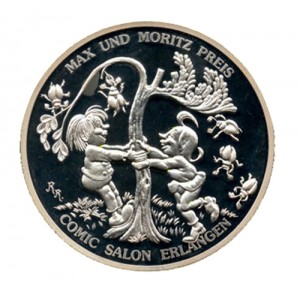
Rupolphe Töpffer, from Geneva, Switzerland, is one of the forefathers of comics, creative during the first half of the Nineteenth Century. Writing originally in French, his influence spread to Germany and the United States. (The University Press of Mississippi has published two massive volumes on his work.)
Wilhelm Busch is the godfather of German comics. An illustrator and writer, he is best known for “Max und Moritz”, a cautionary tale of two scamps. (You can read an old English translation here.) His satirical poetry caused many an uproar, and he was censored for satirizing the hypocrisy of the Catholic church.
Dr. Erika Fuchs is the second-most influential person in German comics. From 1951 until retiring in 1988, she was the chief editor and translator of Disney comics in Germany. Her high standards and references to classical German texts gained her renown among Disney fans. Her use of verbs as onomatopoeia and soundless events (such as “shiver” or “gulp”) has influenced Internet chat dialogue in Germany, where the use of such terms (such as *runs away*) is known as Erikativ. (A detailed explanation for grammaticists, linguists, and Donaldists can be found here, with animated comparisons between the original English comics and German translations. Please note that Disney comics no longer use machine lettering.)
Where should you go?
Here’s a “Comics Messe” list of conventions in German-speaking Europe.
 The biggest comics show in Germany is held in northern Bavaria: the International Comics Salon Erlangen. A biennial comics art festival, it is the German equivalent of Angoulême, although not yet as crowded. (2014 attendance: 25,000) They award the Max und Moritz Preis via a jury, with one audience-voted prize. The titles are international in scope, honoring both local cartoonists as well as translated works. (Read my recap of the 2012 show.)
The biggest comics show in Germany is held in northern Bavaria: the International Comics Salon Erlangen. A biennial comics art festival, it is the German equivalent of Angoulême, although not yet as crowded. (2014 attendance: 25,000) They award the Max und Moritz Preis via a jury, with one audience-voted prize. The titles are international in scope, honoring both local cartoonists as well as translated works. (Read my recap of the 2012 show.)

Those are BUILDINGS. There are 11 total. And, no, it’s not the biggest in Germany.
The other big show? The Frankurt Book Fair. A massive publishing trade show, they allow the public in on the weekend. Since comics have always been popular, publishers and organizers know to schedule events to entice fans. They even host the German Cosplay championship! Of course, there’s also an award: the annual Deutsche Cartoonpreis.
 Since 2006, the Frankfurt Book Fair and Carlsen Verlag have awarded the “German Cartoon Prize for new talent”. Since 2012 the “German Cartoon Prize” in categories A and B have been awarded.
Since 2006, the Frankfurt Book Fair and Carlsen Verlag have awarded the “German Cartoon Prize for new talent”. Since 2012 the “German Cartoon Prize” in categories A and B have been awarded.
“A” stands for cartoonists who have not yet published a book. “B” is for cartoonists who have already published at least one book.
You can buy the anthology book here. Here are the winners from last year:
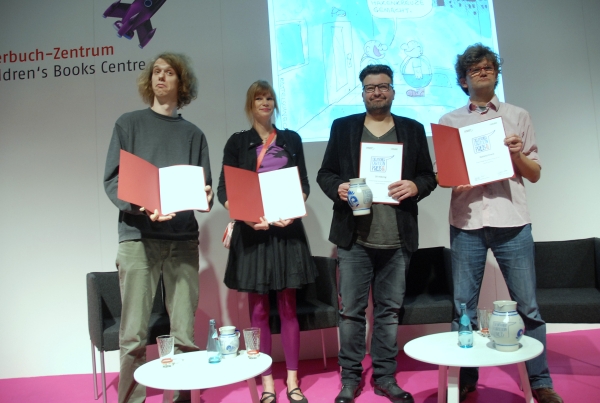
Cartoonprize Category A: Hannes Richert (far left), Category B: Rattelschneck, first prize (far right); Oli Hilbring, second prize (second from right). Third prize: Dorthe Landschulz.
A museum:
 Wilhelm Busch – Deutsches Museum für Karikatur und Zeichenkunst
Wilhelm Busch – Deutsches Museum für Karikatur und Zeichenkunst
In addition to the greater part of Wilhelm Busch’s complete artistic oeuvre, the German Museum for Caricature and Graphic Art in the George Garden in Hannover is home to a collection of more than 35.000 works by internationally celebrated representatives of the art of pictorial satire.
Among those represented are such great names from the past as Hogarth, Daumier, Grandville and Goya, as well as popular “modern classics” of the world of humour such as Ungerer, Sempé and Loriot. And of course, Wilhelm Busch simply can’t be left out.
Want to follow what’s going on NOW in German comics?
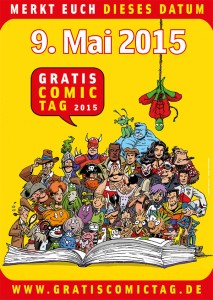
(Yeah, Amazon also has a German branch…)
34 titles! (Wow! That French “Beauty and the Beast” comic looks amazing!)
Newspapers and news sites covering comics!
A brief listing of German publishers:
 Carlsen Verlag, strong in German manga, but also strong in licensed and original work
Carlsen Verlag, strong in German manga, but also strong in licensed and original work
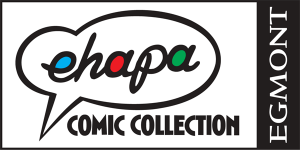 Ehapa, owned by powerhouse Egmont. As with other Egmont houses throughout Europe, they publish, almost exclusively, licensed titles aimed at kids. That means Disney, Asterix, Lucky Luke, as well as other imports. (Jaw dropping fact: Micky Maus Magazin has a weekly circulation of 125,000, and a weekly readership of 623,000! 10.7% of kids ages 6-13! Of course, adults read it too! To put that into perspective… there are some 54 million kids age 5-17 in the U.S.! Imagine five million kids reading a comic book each week….)
Ehapa, owned by powerhouse Egmont. As with other Egmont houses throughout Europe, they publish, almost exclusively, licensed titles aimed at kids. That means Disney, Asterix, Lucky Luke, as well as other imports. (Jaw dropping fact: Micky Maus Magazin has a weekly circulation of 125,000, and a weekly readership of 623,000! 10.7% of kids ages 6-13! Of course, adults read it too! To put that into perspective… there are some 54 million kids age 5-17 in the U.S.! Imagine five million kids reading a comic book each week….)
 Panini Comics Deutschland Once owned by Marvel in the 1990s, Panini is best known in the U.S. for their sticker albums. In Germany, they license just about every American comics title available.
Panini Comics Deutschland Once owned by Marvel in the 1990s, Panini is best known in the U.S. for their sticker albums. In Germany, they license just about every American comics title available.
Reprodukt is a publisher of liter ary graphic novels. If you flip through their catalogs, you’ll see the usual suspects. A very good list!
ary graphic novels. If you flip through their catalogs, you’ll see the usual suspects. A very good list!
Avant Verlag is a general publisher, but has a very strong catalog of original German graphic novels, as well as imports.
Tokyopop [No! Really!] Apparently, Kodansha and Viz haven’t figured out the German market yet, so Tokyopop has the German licenses for Deathnote, Bleach, Hetalia… as well as publishing local talent.
And some recommendations:
- Haarmann (Hardcover) von Peer Meter, Isabel Kreitz
“Fritz Haarmann, one of the most brutal serial killer in Europe, worked as an informant for the Hanover police. Night after night he roamed the waiting rooms of the station looking for young, unaccompanied men. With the help of his police identification card he could gain the trust of his victims. He led them to his apartment, raped them and with a sexual frenzy, bit them in the throat.” (One of the inspiration for “M”, and the subject of Fassbinder’s “The Tenderness of Wolves”.)
- Genius of Wilhelm Busch: Comedy of Frustration by Wilhelm Busch; translated by Walter Arndt
Readily available in the United States. English translation of Busch’s work.
- Deutsche Welle has a nice video report on a travelling exhibition of German comics art, which I can’t embed. Here’s the catalog to the exhibition. (Here’s hoping it crosses the pond!)
- E. O. Plauen was a popular, and tragic, figure in German cartooning. A master of the silent cartoon, best known for Vater und Sohn, he was arrested by the Nazi regime in 1944 and committed suicide the day before his trial.
- An actual professional organization! Der Interessenverband Comic, Cartoon, Illustration und Trickfilm e.V. ICOM. They represent cartoonists, comics creators, and animators as a trade group, publishing guidelines and promoting the craft.
- And finally…. from 2011, a book list from the Frankfurt Book Fair which inspired this post! “Borders”.
- …and another list from 2013, in German AND English!
Comics in German have now made it into the mainstream of society. For this reason, more and more publishers are now showing an interest in the new forms of storytelling that are unique to this illustrated genre. Our selection demonstrates this with a wealth of new names, who represent a broad spectrum of both subject matter and graphical techniques. It was the term “graphic novel” that first broke the ice. Booksellers and readers alike expect that the comics listed under this heading will offer meaningful content as well as a wide diversity of styles. For instance, it is now just as common to see journalism in comic form as it is to find experimental design work in terms of page architecture or picture structure.
At the same time, an intriguing development can be seen with the rapid growth in the number of literary adaptations. This means comics are tapping into entirely new strata of readership.
They are now gaining some cachet among the sort of booklovers who would, until now, have been sceptical of the quality of their subject matter.
From fairy tales to novellas and novels, every literary genre now seems to provide a suitable challenge for the comics illustrator. Publishers such as Suhrkamp and Edition Büchergilde have even launched their own special comics series for adaptations of famous works.
German-language comics have therefore broken into a field that was hitherto covered only by foreign language publications. And new opportunities are emerging for illustrators, who for years have complained about the dearth of good stories. The enthusiastic reactions of readers and critics alike to the new works make it clear that the comic has now arrived in the German book market
If you have any more recommendations (either websites or graphic novels to read) please list them below!

Let’s just say the manga advice series I did has reaped some…benefits. And other stuff that I didn’t expect. Whatever the case, there was an answer in the manga adapter piece that naturally raised an eye:
…and specifically comics-related experience, is going to serve you well. And whatever the industry overall may say about scanlations (and believe me, I could totally rant about aggregator sites all day), that’s not a bad thing to have on your resume, as far as I’m concerned.
When that was said, I naturally was curious and asked if she was serious about being able to rant about aggregators and scanlations all day. Her response by email:
I would totally be up for a good rant!
So that’s how I have this conversation I did a few weeks ago with Lillian Diaz-Przybyl, the adapter of Loveless and adapter/editor of a few titles on Crunchyroll and former editor at TOKYOPOP, today for your reading or listening pleasure. Have fun!
Before we begin, let’s start in the past: How did you become interested in manga, and how you got into the manga industry?
The short version is I’ve been a comic book fan pretty much my entire life. I’ve read a lot of Asterix and Tintin when I was a kid. I went through a big Marvel Comics phase when I was in late elementary through middle school, and then I’ve also always been interested in Japanese culture for various reasons. When I was in high school that’s when Sailor Moon started airing on Cartoon Network, and suddenly these two interests came together for me, like Japan and then the animation/manga side of things, and I really got hooked.
Because Sailor Moon was my first anime and manga love, I knew about TOKYOPOP from really early in the process and kind of in the back of my head I was always like, “Yeah, wouldn’t it be fun to be a manga editor someday, that would be a cool job!” So I went off to college, double majored in English and Japanese because I liked languages, and the Japanese department was small, I really enjoyed it there. I kind of expected I graduate, go work somewhere for a couple of years, and maybe go to grad school.
By a stroke of fortune, TOKYOPOP happened to be looking for a junior editor, it was the first time they had a junior editor position, and they were specifically looking for someone young, who they could train in the ways of creating original manga specifically. This is 2004, almost exactly 10 years ago at this point. And I had the right skill set for that. I had the Japanese language, I had the English, I done an internship in publishing in New York over a summer, so spring break my senior year in college I flew out to Los Angeles to interview and a couple of weeks later they hired me and almost as soon as I graduated I moved all the way across the country to LA and started a new job.
I was at TOKYOPOP for almost seven years, little over six and a half years, basically until the company shut down so I got laid off in February 2011 and the whole company shutdown two months later. Which was a pretty long haul as far as TOKYOPOP is concerned. It’s a company that always had a high staff turnover rate for various reasons, but it also had a really great gift for attracting interesting and hard-working people, so almost all the people who I know at TOKYOPOP have gone on to do really cool and interesting things, a lot of us are still really good friends with each other, so even though it was, you know, it ended in me getting laid off, it was still a really great experience for me to have and I’m glad I moved to LA, I’m glad I had this opportunity, and I’m glad they gave me that opportunity. I mean, they didn’t know who the hell I was when they hired me as a 21 year old so…to pull myself all the way across the country…I hope they think that decision paid off for them.

So how was it like to work at TOKYOPOP, back when the manga industry was doing pretty well, and then conversely, when the economy started to decline?
You know it’s interesting, because for all the flack TOKYOPOP gets for a lot of things, they were really prescient about where the industry was going. Part of the reason why, and even in 2004 when everybody thought the manga industry was at its peak, and it was, there was a sense internally that things weren’t necessarily gonna last. There’s a variety of reasons why that was the case.
For one, Kodansha had been one of the licensors that TOKYOPOP worked with a lot, from Sailor Moon to Peach Girl to Parasyte, to a lot of CLAMP titles, and Kodansha was moving away from TOKYOPOP and started their relationship with Del Rey, which was a big licensor hit in terms of what titles we had access to, and the philosophy behind trying to do original content was in part because we wanted to have our own titles to replace the licensed stuff coming from Japan, to see if we could get kind of a homegrown manga industry going in the US that would give us access to stuff that people were excited about in the same way they were excited about Sailor Moon or Fruits Basket. It didn’t really work out the way we entirely expected it to, although I’m still really proud of the titles that we did, and, speaking of people who have really been watching the industry, a lot of the artists who worked for TOKYOPOP have also gone on to do really interesting things in their subsequent careers.
So yeah, I think there was a sense of flux right there, in terms of the direction that things were moving in, and this is something I’ll talk about later in this rant, but there’s a lot of great things about being able to work with licensed titles, but there’s a lot of restrictions that come with it as well, and when you are the co-creator or part owners of original content, that means you have a lot more flexibility with what you can do with those titles and that includes, among other things, releasing them digitally, which was something that the Japanese licensors had been really, really, really slow to come around to. I mean any company’s gonna have its ups and downs, particularly a creative company, and one involved in a volatile industry. You know, Stu Levy’s a really big personality, and he and I have always gotten along really well, and his decisions were a big part of why they wanted to hire someone like me, so I’m really grateful for that. But you know, every company has its ups and downs…but I got to work with so many terrific, motivated, smart, and committed people over my time there and I wouldn’t have given that away for the world!
Ok, it’s time. Now you get to rant. Feel free to start wherever you want!
I think the best way to approach this subject is to kind of talk about the history of anime and manga content on the web, and I can track it through some of my own personal experience with that side of things. Like I said earlier, I started as an anime and manga fan with Sailor Moon in 1998, so I was using like, AOL and dial up to get access, and this is back in the days when there were very few anime titles being released in the US and there’s basically no manga. Viz had been doing Ranma ½ and a couple of other things, but you know, TOKYOPOP was just starting to release their magazines and then probably when I was a senior in high school was when they started releasing the bind up versions of Sailor Moon.
Until then the only way you could get that content was through basically illegally trading tapes with other anime and manga fans online. I don’t even remember who I got this from, but there was someone who I found through a network of fans who, I think I paid them like 10 bucks or something, and they emailed me a videotape with 12 episodes of Sailor Moon Stars taped onto it. This was like crappy quality, it’s 12 episodes, I think I asked for the beginning and then the very end of the series, because at the time it was being released on Cartoon Network but they only done the first two seasons, like Sailor Moon S was just getting released as I was heading off to college.
So I knew that there were 5 seasons of content out there and there were a couple of sites where you can find out general episodes and summaries of what was happening, but the only way to actually see them was through these pirated means. It was slow and they were low quality, so anytime you had an opportunity to purchase legitimate content, even though it’s still a VHS tape, like I went out and brought the Sailor Moon S movie when it came out on VHS, and that was just so much better quality than these third or fourth generation fansubs that were going around. It just hasn’t been taped over a zillion times.
And I think part of that kind of barter process was instilled in it, the idea that, “This is not the best way to enjoy this material.” The best way to enjoy it is to purchase a legitimate copy. The fan community was very much driving the other fans and within itself to these legitimate sources when they became available. For whatever reason I don’t remember there being much scanlation going on at the time. I think the resources were still too limited for that to be the case, and then I kind of disappeared into college in the mountains, so I feel like I fell out of what was going on in bookstore culture and I went back in and suddenly there’s this enormous manga section, things have completely changed in that two or three year time. But at the same time I was ahead of my college’s anime society for a couple of years so I was in charge of purchasing, so as more things were starting to become available, and the industry was really starting to grow, we had access to more content that I was able to spend some of the school’s money to purchase that and again, find these legitimate sources to bring the stuff over for my friends and colleagues in college.


At first I really started paying attention to scanlations ironically when I was studying abroad in Japan and at that point I had two and a half years of Japanese language study under my belt so I could kind of read manga relatively competently and I was completely obsessed with Hikaru no Go. I had a boyfriend back in college who wasn’t a Japanese major but he’s the one who actually taught me how to play Go when we first started dating, and so I read this series about this kid who plays Go and I was like, “Oh my god, he would totally love this! But I’m reading it in Japanese, there’s no way for him to read it, I’d really like to share this with him but what can I do?” And a friend of mine told me about this website called Toriyama World, which was a scanlations community that was mostly doing Shonen Jump titles, they were doing Hikaru no Go, Bleach, Hunter x Hunter, and Naruto. So I sent my boyfriend these links and he got to read Hikaru no Go at the same time I was reading it. It was really exciting, and it made the long distance thing a lot nicer.
Simultaneously, Toriyama World started fansubbing the Naruto anime as it was coming out. And that was my first exposure to BitTorrent, and boy did that change everything. So instead of crappy third generation fansubs that are passed around on video tapes or like the year before one of my anime society friends found a cash of fansub stuff online and kind of dumped it onto the school network so I spent a couple of days of finals week downloading—
W-Weren’t you supposed to be studying or something? *laughs*
Oh I was totally studying, I was a Japanese major…I was a bad Japanese major, I bet my Sensei’s were all ashamed at me *laughs*. So this was accessing content in completely different ways. We’re talking DVD quality, coming out the same week as the episodes in Japan, with, depending on which group you were talking to, there were varying qualities of translation, but they were generally pretty good.
Skip to two years later, I get hired by TOKYOPOP, two of the founders of Toriyama World are my co-workers oddly enough – it took me a while to figure that out – so there was an obvious connection between scanlations and fansub industry and “legitimate” anime and manga industry. There’s a lot of translators, at least there were, I assume this is still the case that we’re coming out of, the fansub community, there’s a lot of editors who were coming out of the scanlation community.Both editing and translating are kind of apprenticeship positions where you can be a Japanese major and sort of learn the language but the way you get good at sort of the nuance of translating things that are colloquial which is by practice, there’s kind of a learning process. Textbook Japanese and what people use in real life VS Japanese that people use in anime and manga. And you kinda have to practice that and the scanlations and fansub community is one way to get that experience. And there’s definitely a recognition, or certainly a tacit recognition, in the industry, that these people who are really passionate about the media they’re working on, they really care about the quality, so they make good employees.
Fruits Basket had just been licensed, or just started getting released when I started at TOKYOPOP, I think we were on volume 5, and that series had been picked up by TOKYOPOP in part because of an online survey that they run, which asked what titles should we do, and everyone was like you should do Fruits Basket. People wouldn’t have known about Fruits Basket as even an option if it weren’t for things like scanlations and fansubs. It’s very clear that those built a level of awareness for some of these early properties in the marketplace at the time and they still do.
This is why it’s kind of exciting where we are now: Magi shows up on Crunchyroll and it’s a huge hit, people seem really excited about it, so when Viz picks up the manga rights to do a release of that there’s a group of people that are already super into that series and they’re planning to buy that book. It certainly happened with Attack on Titan last year.
So the feedback loop between sort of brand awareness and however you’re getting it, and people purchasing the stuff later, that’s really important and something the industry is very aware of. The problem that you run into – and the animation community has been able to solve this problem thanks to services like Crunchyroll, Funimation, Hulu and being able to get these series simulcasted in Japan – that hasn’t really happened quite as much in manga, and there’s a lot of reasons why that’s the case, but it’s incredibility frustrating why this is the case.

The best example I can think of is during my final few years at TOKYOPOP. I was working on a series called Gakuen Alice, which is a long running shoujo series, it ran in Hana to Yume, the same magazine as Fruits Basket. We started it as soon as Fruits Basket finished, and there was a sense in the company that we needed another big hit. Fruits Basket had been an enormous money maker for TOKYOPOP for years and there wasn’t anything that was such a big hit on the horizon for us, and for a lot of other companies as well. We were going to really try and make Gakuen Alice a hit.
And there was a lot of reasons why I didn’t think it wasn’t ever going to be that big a hit, or at least not in the same way: it was a different tone, it’s a different kind of age group, characters are much younger, and the story’s dark but in a different way. But it’s still a really good series, and it’s something that I really enjoyed working on and I’m very proud of, and it sold…not very well at all. Like it didn’t even sell like half of Fruits Basket numbers, it sold like less than a quarter of Fruits Basket numbers, which, whatever, media creations are a tough industry. You can think something can be a hit but it’s not, hits come out of nowhere, we would be completely surprised at what people were picking up on.
The frustrating thing about Gakuen Alice was that at the time – 2010, 2011 – it was the third or fourth most popular series on MangaFox. There were literally millions of people reading that series every month. And not even a fraction of them were actually buying the book. You hear a lot of criticism of “legitimate titles not being as good and the translations are awkward, fansubbers are more authentic, and etc, etc.” Yeah, maybe sometimes, but the scans for Gakuen Alice were terrible. Absoultely awful! Like they were scanning stuff from the Chinese editions and sort of backtracking it into English, everything was awkward, the quality of it was terrible from a visual perspective, and we were working our butts off to make this a really good looking book. So it was incredibly frustrating to see that there was all these people enjoying an inferior and mediocre product and we have something that we really want them to enjoy and get excited about, and they weren’t doing it.
But I don’t think this is really the fault of the fans, or at least not directly, and I don’t think it’s the fault of the companies. I think it’s kind of a larger issue where there’s a disconnect between enjoying content online and realizing where it comes from, and that there’s people who make their livings by creating it, and when you’re enjoying it for free, you’re sort of denying people the ability to make their livings. And obviously with the demise of TOKYOPOP for whatever reason, that denied me the ability to make my living for a while, and I started doing other things instead, and just doing manga as a sideline freelance business.
But for the creators back in Japan, for original creators here — so like I spend a lot of time on Tumblr, and I see this all the time, every single week: there’s some artist who are great fan artists, great original artists, and they post stuff on Tumblr, and then a day later they see their work going around with their name not attached to it anymore. And you’re like “We’ll ok that’s great, the people are still seeing your work and you’re still getting your art out there to the broader world and they’re enjoying it.” But these are people who do this for a living, whether it’s because they’re being paid to or they make money doing commissions, so when you take their name off it and sort of disconnect them from that process, the million people who saw that piece of art, maybe 1% of them would have liked to give that artist $10 for a commission or buy a poster for $20. And they don’t have the ability to do that anymore.
And they will have fights with the people who are taking their name off and it would turn into this weird artistic rights discussion of like, “Yeah you should just appreciate that people are enjoying your stuff.” But it’s like, “I need to buy groceries, you know, this is my job,” and whether people are like, “Oh, artists should just do what they love because they love it.” Well, yeah, hopefully everybody has a job that they enjoy to some extent. But, some of these people have gone to school for this in the same way people go to be a lawyer or a doctor, so you don’t expect a lawyer or a doctor to work for free, why would you expect an artist to work for free? “No, it’s because they’re passionate about their craft!” Well yeah that’s true, but again, somebody’s gotta pay the bills.
So I think that kind of fan feedback that had existed when I was first getting into the fandom and then into the industry has been completely disconnected, both by internet culture in general and by the nature of the aggregator sites, which, they’re not even connected to specific scanlation groups, like the Gakuen Alice chapter – one chapter would be done by one group, one chapter would be done by the next group, there’s group credit there, you would go back to their website and would see that…it becomes this kind of meaningless product that you just blaze through at 100 miles an hour and read 100 chapters of manga over the course of an evening and it kind of goes in one ear and out the other. Manga is designed as a product to be read quickly and to be read in bulk like that. I can see, I’m 100%, as a manga fan, understand why that’s appealing, but the fact that very little of that traces back to an idea of “I love this creator, I love their work, I want to support them,” that’s what I found very frustrating.

And for some people, it’s not even on their radar in some ways. One of the artists that worked for TOKYOPOP, Queenie-Chan — she did a series for us called The Dreaming, and she’s done a lot of manga work in various contexts since then — has been doing a couple of articles recently on what it’s like to be a Western manga creator or non-Japanese creator and she worked in Australia. She talked about doing a presentation to middle school kids and showing them what kind of stuff do you read and what they were into and she mentioned that you could go buy it somewhere, and the kids were like, “You can buy manga?” Like they just had no idea that they could go to the bookstore and buy copies of the stuff that they love.
I read that article. I believe they were in the library for this presentation, right?
Yeah they were in the library, it’s like, “urgghh!” That’s so…urgghhh, I feel so bad for my friends who are working at Viz and Yen Press and stuff and like, “How do you overcome that? How do you kind of deal with that disconnect?”
…Yeah, that’s kind of the bulk of my rant. *laughs* I mean the secondary thing is, and this is another reason why I feel sorry for my friends who are still working on the company side even though I envy their steady paychecks, is the licensors, and the nature of digital publishing in the West. It’s been so difficult to get comics content to a place where you can buy it digitally. And I think that more and more people want to consume things on their computers and they want to read them on any sort of tablet device, but that’s a relatively new thing.
So when I was at TOKYOPOP, ComiXology as a company was just starting out and we were trying to work with that to put some more titles up there, and since then ComiXology’s become huge and recently TOKYOPOP’s managed to put our old original titles on ComiXology, and I know there’s a few other manga publishers who are doing some licensed stuff on there. The Japanese, kind of rightly or wrongly — it’s not really my place to make a judgment on this, and also I’ve been out of that part of the industry for about three years now, so I’m not as up on this as I used to be — they’re really nervous about digital stuff. They’re really nervous about putting content from different publishers in the same context together. That’s always been an issue, like, back in TOKYOPOP when we had an advertisement, “There’s a bunch of TOKYOPOP series, we want to put them on one page together!” But characters from one company, like characters from Hakusensha and here on the side characters from Kadokawa. Ok, fair enough. But that means when you’re coming up with a way, like what would the Crunchyroll of manga look like, and now there is a Crunchyroll of manga, and there hasn’t been until very recently. Like that was a really difficult thing for the Japanese to come and agree to. JManga tried to do it but they were working with what I would describe as second-tier licensors for the most part, and so the content that they had wasn’t necessarily what people were excited about — although I was excited to be working on Tactics for a while.
But yeah, they were really worried about sort of reverse importation, so like stuff coming out digitally in the US, then people reading it in Japan, and it was very strange at the time. So just trying to get digital rights out of them was like pulling teeth for so long. And that really felt like it held back the industry when it was clear that was the direction things were going in. I don’t really know what flipped the switch and what made that change all of a sudden. Maybe the success of Crunchyroll in general, maybe it’s clear that ComiXology and similar programs is a profit making opportunity and that is something that is working well and so many people want to engage in, but it was so incredibly frustrating as someone working at TOKYOPOP to see the writing on the wall and see that like, there’s so many people who want to consume this stuff online and we are unable to provide that for them.
I mentioned this in the manga adapter interview that a lot of the people in the US publishers know what the problem is, and then convincing the licensors that that’s a problem and that we need to find a solution to it, that’s a whole ‘nother story. So it feels like the people on the US side get the blame for these decisions like “why do you do it this way?” We would if we could! We would love to do that! Write a big email to so and so in Tokyo and tell them that’s the way you want to consume your media because we’ve been telling them that and it hasn’t been moving things forward.
So…yeah….I feel that’s a relatively reasoned rant. Was that sufficiently ranty for you? *laughs*
*laughs* You said all day!
Uh…well I can keep talking! *laughs*

Well ok, I guess a couple of things I can bring up…you made a great distinction about how times have changed, like back then you could put up an online survey and people would actually buy the product, but I think nowadays if you try and do survey, like I know there are people who would want to buy a series called Chihayafuru or another series, but then, there are people who then won’t buy it. Like, what’s going on here?
That’s the really frustrating thing about online polls. They get answered by the people who like answering online polls and they don’t necessarily predict consumer behavior. That’s been one of the frustrating things about the industry, and while I think this is true for about any sort of consumer industry, media in particular, there’s often been a disconnect between people who actively communicate with the company and the general buying public. So if you went by the taste of the manga blogosphere, you’d think we need to be publishing a lot more indie, josei, and seinen manga…and that stuff doesn’t sell.
I mean I love those genres, and I’m kind of indiscriminate in my reading taste, I’ll read almost anything, but yeah, we’ll see how this changes, I always have this kind of belief that the kids who are reading, who are 15 while I was 25, and were kind of getting into anime and manga at the same age that I was when I was getting into it, would kind of blow through shoujo and shounen stuff, and if they continue to be manga readers their taste would mature and they’d start to want stuff that’s a little more complicated, more sophisticated. That’s not to underrate the sophistication of shoujo and shounen, I think there’s some really amazing stuff that happens there, but there’s a difference, and we’re just starting to get to the point of the industry where now those kids are almost 25. They’re where I was when I was working at TOKYOPOP and my tastes started to change. So I’m curious to see how that affects things and if their tastes do start to align more with their age group in some ways.
That’s a difficult thing, you have to always take feedback, online polls, and what the reviewers say with a grain of salt. “Like that’s your opinion, you’re really smart and we respect your opinion, but I think the 10 other thousand people reading this title are reading it for very different reasons than you are. And they’re getting something very different out of it than you are.” And I think that’s okay. We think that’s a need that we need to serve. And just because you love this series doesn’t mean that more than 5 other people are going to love the series. And 5 people are not enough to make a book profitable.
This is the way the publishing industry works in general. What happened during the early days of the manga boom is that everything was a best-seller, everything was selling thousands and thousands of copies, and as we blew through the pre-existing titles that everybody knew and was excited about and started to get to things that were newer, more obscure, or didn’t have the name recognition like a CLAMP, things started to even out and so it resembled more what conventional publishing in the US looks like, where the Dan Brown’s and Stephen King’s, and Fifty Shades of Grey’s of the industry paid for everything else. There are very few things that are popular or super profitable. It’s the few bestsellers that support the rest of the industry. And that’s kind of the way I think things are now. That’s just the way it is. And if you have enough best sellers, and enough stuff that’s doing well, then you can afford to take on stuff that’s a little more different and unusual and a little more risky than to kind of feed that niche but you need to have that core of people buying Naruto & Bleach every month to be able to take that risk as a company.
It’s been interesting, now that I’ve been out of the industry and see it from the outside. to see what people are doing with stuff. Like Yen Press really likes to do these high-end cover editions for stuff, it’s a little more off the beaten path. So like A Bride’s Story, which is a gorgeous book, I don’t know what the sales numbers are for that, but they’ve done a fabulous job with it and it’s not something that I would expect to be a huge best seller, so I hope that they’re making tons and tons of money on it because it’s so great, but I think they’re counterbalancing that by making it a higher end product. It costs a little bit more, so maybe only half as many people would buy that as an average Yen Press title but they can balance out the profitability by making a higher end edition.
I think the companies here are getting creative with how they strategize and manage to kind of put out more unusual content without it making a huge dent in the profitability, but that’s always going to be a tough battle.
How do you think the scanlation system has changed from when you started in the industry to today? When we traded emails you talked about there was a difference from the old system compared to today, so could you elaborate on that?
I’ve never been directly involved in scanlations on the creation side so I may be speaking out of turn on this, but I feel like there’s, as an occasional consumer of scanlations, there’s certain groups that really pride themselves on quality and groups that pride themselves on speed, or function like that’s their goal, to get it out there as quickly as possible. And I think that’s really interesting. And again, the aggregate sites you get a mix of translation and production quality. You can really sort of see that in action, almost on a chapter by chapter basis like, “Oh this translation I understand what’s going on, it’s really clear, it’s catchy and punchy,” a chapter later you’re like, “Ughhh, this barely looks like English! Like did they just run this through Google translate? What the hell is this font that they’re using? Did they even bother retouching this stuff? *laughs* Even the scan quality’s really weird!”
And I feel like back in the day where there’s a higher bar of entry, where it was a little harder to put together a group of people and have access to these resources, it forced people, you know it was only people who were committed to this, and into it, who were going to bother with this stuff, because you have to obtain the volumes from Japan, you’d have to have a pretty good scanner, internet speeds were slower so it takes a longer time to upload images, and sharing back and forth between people is a lot more of a pain in the neck. I think that just slowing down the process a little bit, it would reinforce quality. At the same time…I hope this doesn’t come off as “Oh, everything is terrible now, the internet’s ruined everything—“
Uh-oh! *laughs*
*laughs* No, it has absolutely not! I think the modern age is amazing, the resources available and the fact that so many people all over the world can enjoy this stuff and can get involved in this I think is amazing. So I think that the resources that are available to people now are just—I couldn’t even imagine when I was a teenager. Like there’s just so off the radar of what’s possible. But I guess I want there to be a little more consideration of the process and for people to think a little more critically about what they’re doing, and that it’s not just “this content magically exists and we’re going to magically put it on this site so billions of people can enjoy it, possibly at the expense of the person working very hard to create it,” Because manga creators work hard, that is a thankless job. Unless you’re one of the big ones, you’re not gonna be making a living doing it. I feel that there’s some sort of anarchist corners of the internet that’s like “wrest creativity away from corporate productions,” and you know, ok, whatever, but your average manga creator, these people work themselves to the bone to make this stuff!
I saw the creator of Nura: Rise of The Yokai Clan’s schedule. I went like, “Wait, you only get two hours of sleep on one day?!?”
Yeah, like the people who work on weekly schedules, sure they got like eight assistants working for them but they’re doing 20-30 pages a week, that’s crazy!
In a certain way Bakuman showcased the type of work schedule a mangaka usually goes through.


Right, right. Yeah, say what you want to about corporations, and I’ll be the first to get in line and be like, there’s a lot of nasty things that can be said about some of the corporate domination of media, but at the end of the day the people who suffer when this material’s been pirated are the people who are creating it. And those are the last people who should be suffering. Because you know the great thing about manga is that it’s so creative and inventive and the best stuff out there is really amazing and those people should be profiting from their work.
So I think one of the things I mentioned in the manga adapter email was that I thought that the quality of translators in general was improved. I’d be curious to hear what other people in the industry think about that because I think to some extent it’s part of the generation of people who grew up on this stuff and are coming of age and now they’ve graduated college with their own degrees in Japanese or whatever, and their own ideas on how manga should be read and what’s the best way to do a translation, and I think that’s really cool and interesting. I’d be curious if other people, even anecdotally, share my feelings on that.
Adapters are still a really important part of the process and to some extent it’s because I believe in the process of specialization. I myself feel like I’m the jack of all trades but master of none, so I really respect people who commit themselves to getting really really really good at one part of their craft, whether it’s being an artist, writer, or being a manga adapter and being able to come up with — and I said in my answer that I have a hard time coming up with distinct character voices. I can recognize them when they’re there, but honestly creative writing’s not my specialty, so finding someone who really knows how to make one character’s speech style distinct in English as opposed versus other characters, I think that’s really a great skill.
But I feel like at the same time more and more translators that I work with kind of get that and they know what manga is supposed to look like, sound like and they just have a better instinct about that in some ways? It’s not universally true, like there’s definitely some scripts that I feel like I have to massage a lot more than others, but I don’t know I guess I find that heartening.
The other funny thing about scanlations/fansubs industry going legit is that you have a zillion people who are used to working for free and now there’s some freelance opportunities when you’re like now I can pay them something! You don’t end up getting paid very much, but I think for a lot of people it’s like, “I was doing it before, at least now I’m getting something so it’s gotta be good!” I think that’s really a bit of the problem. Because you compare what people are getting paid for digital content versus what they’re getting paid to work on stuff that’s going into print, and there’s a huge difference.
I mentioned this in the previous interview as well because a lot of this is because I had no idea what the profitably is like in the digital space, and I don’t know if anybody else does either, I’m sure the people inside the company has a better idea than I do, but I still think it’s a new enough part of the industry that I think it remains to be seen how much money you can invest in it and still be profitable. I’m hoping it’s all really successful, and that it continues to grow and thrive, and that everyone gets a pay raise at some point. I think everybody who I’ve worked with really loves what they’re doing and they’ve worked pretty hard and I’d like to see them get compensated for that a little bit better.

One last question: It feels like, for people trying to get into manga, they’re really unsure of what’s legal and what’s known, so I want to just ask you do you think manga publishers are doing enough to educate people on manga, what goes into making manga, etc? Like a couple of months ago the New York Times did an article where they were listing comic book apps and they listed a manga site app…but it wasn’t a legal one. So it makes you wonder: are manga publishers doing enough to say this is what’s legal, this is what manga is, stuff like that?
That’s a really good question, and I think it ties into something I said before where there is this cultural disconnect between content creation and legal vs illegal or intellectual property rights. In some ways I feel like it’s not just the manga publishers’ job to do that. Like maybe there are ways they could be addressing that a little bit better and be more proactive about that but at the same time I feel like saying that kind of throws anime and manga fans under the bus and it’s definitely not just them. Like anybody who pirates a TV show or downloads a book rather than paying for it and downloads a PDF somewhere, like I think there’s a whole cultural conversation that needs to happen about IP and how the work gets handled. And this is what we’re seeing and that’s kind of a side result of it that happens to be particularly obvious in this particular industry for certain reasons.
I think this is where I’m going to be really off the mark because this was stuff that was going on three years ago and I have no idea how it’s developed internally since then. There was for a time, sort of an attempt, among the US Manga publishers to join up and shut down sites like OneManga and MangaFox that kind of got thwarted for various reasons, partly because we were a US company and some of these hosting sites were hosted in places where the US doesn’t have any sovereignty. If your servers are in Russia, or Sweden, if you’re PirateBay or whatever they were based, there’s only so much you can do under US law to be able to deal with that. And even if you do, it’s super expensive, so if you’re running a business that’s on a tighter profit margin, is it worth spending a million dollars in legal fees to try and prevent that? Maybe? Maybe not? I think that’s a really hard calculus to make. And again, I have no idea where that ended up panning out internally, this is what I recall from three years ago.
That’s another thing, marketing to people in this day and age is really tricky, particularly kind of the younger audiences, kids who are on their cell phones, on the internet all the time, kind of talking to them in more conventional marketing ways, whether it’s like the ads in the back of the books or stuff at conventions, I think it’s really difficult to have that conversation to get people to pay attention to it. So it might be nice if people did more but I’m not sure what that would consist of, other than a larger cultural conversation. Who knows, maybe it’s already being addressed just by the companies trying to provide alternatives in better ways so if people want to read manga digitally now we’re starting to have a lot more viable ways of doing that. I was thinking about this the other day, would it make sense for Viz to advertise on MangaFox?…Maybe?
*laughs*
Like…kind of? Like how much are the Japanese licensors are going to totally flip out if that happens? The idea that Viz is giving money to the people who are stealing from them, allowing this method of stealing from them. Obviously not necessarily Viz, MangaFox only posts things that are not available, etc, but yeah the Japanese licensors are going to be pissed about that. I remember that that was a debate internally at TOKYOPOP at one point, it was like, “Do we try and squash these companies or do we try and advertise on them?” *laughs* Like it’s a weird calculus to have to be making.
And I would say for all the things that are super frustrating about aggregator sites, there is still the awareness factor. There are still ways of providing kind of a preview taste of content and getting people excited about it. Game of Thrones is one of the most pirated shows on TV right now but it’s still a huge hit as far as HBO is concerned. Is the piracy preventing it from being a huge hit or is it helping it because more people are being exposed to it and maybe they’ll later buy the DVDs or merchandise? That’s really one of the more bizarre things about the media landscape right now: does that really help or hurt? I think it hurts more than it helps, but there are cases where you’re really not sure about it. So…I don’t know. I’m glad that’s not my decision!
But I do hope we have that cultural conversation sooner rather than later because that reflects so much of a landscape right now, but yeah I’m not sure that’s Viz’s responsibility to lead the way on that necessarily. Or people are just like, “Oh it’s Viz, they got like tons and tons and billions of dollars because they got Naruto, so we don’t really need to bother giving them our money, they’re already rolling in it.” Yeah, but they’re a publishing company. Publishing companies are never really rolling in it. I think that’s what people need to understand. It’s not like Hollywood where Disney has a gazillion different profit centers and they’re really raking in the cash. Publishing is always a really hit or miss game.
Lillian, thanks for taking the time to do your “Rant”. *laughs*
Thanks for giving me the opportunity!
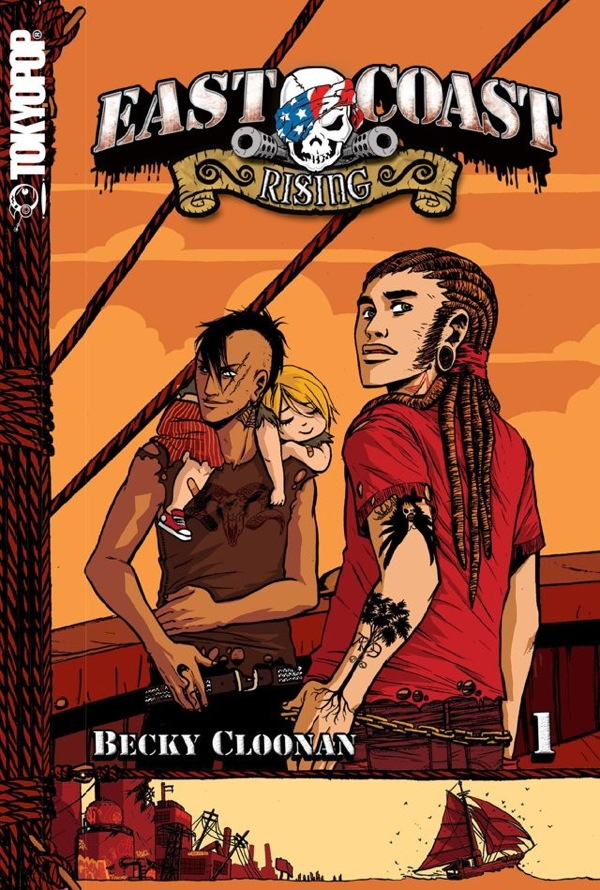




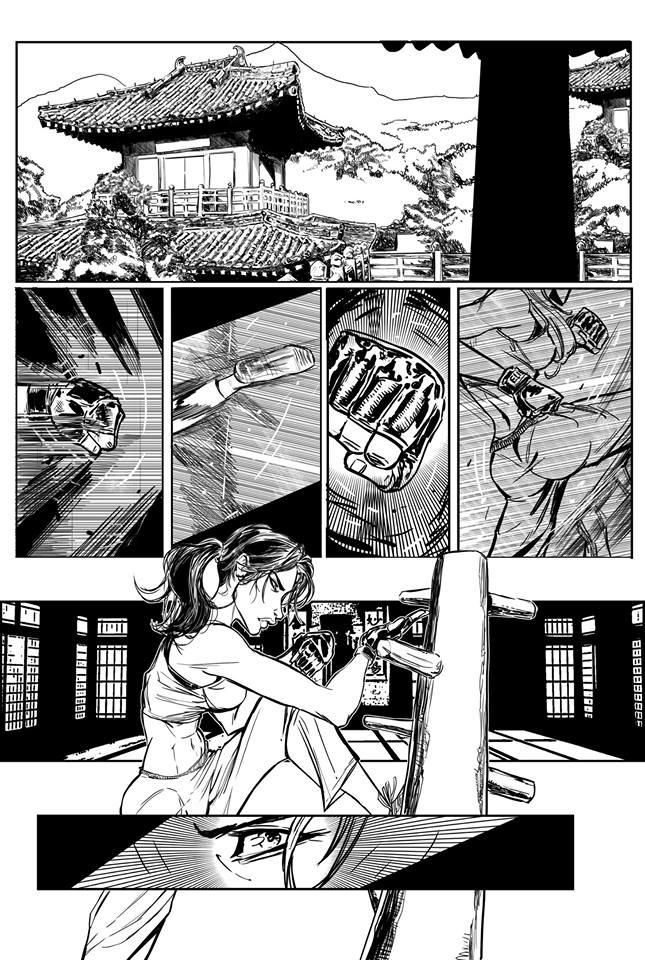






 MyComics.de
MyComics.de Carlsen Verlag
Carlsen Verlag

 ary graphic novels. If you flip through their catalogs, you’ll see the usual suspects. A very good list!
ary graphic novels. If you flip through their catalogs, you’ll see the usual suspects. A very good list!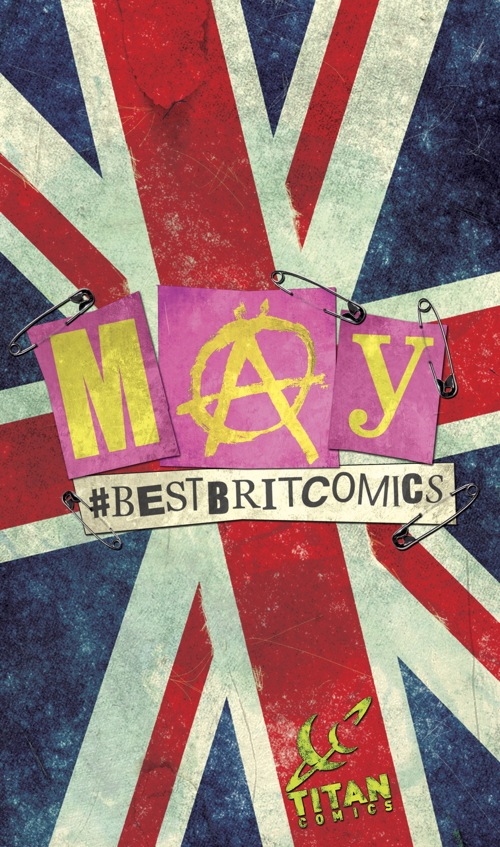











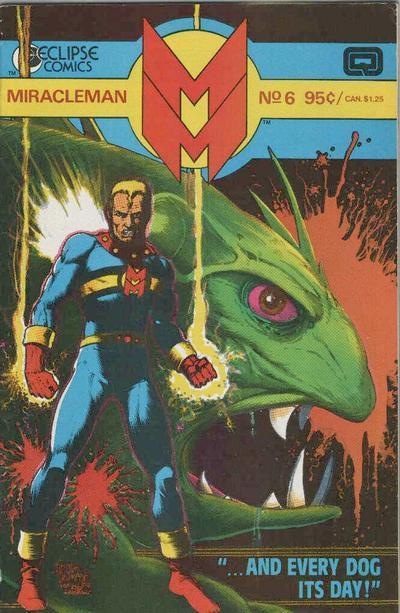
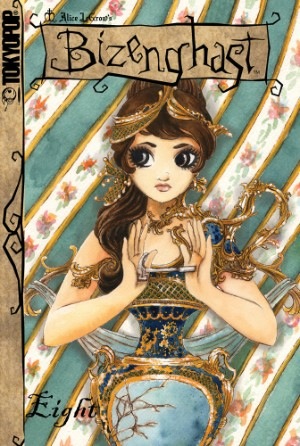
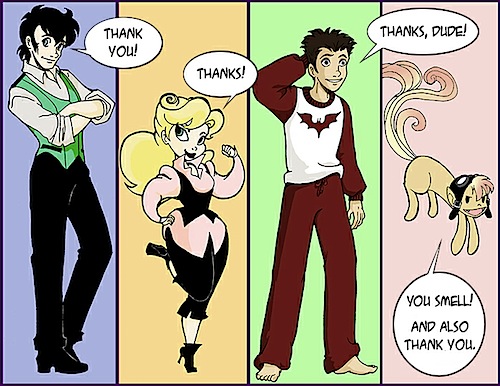
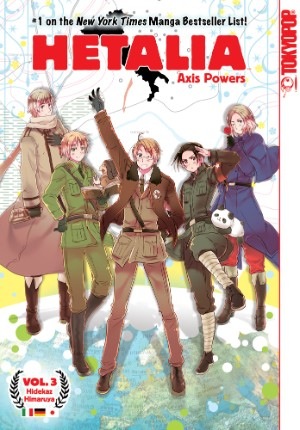
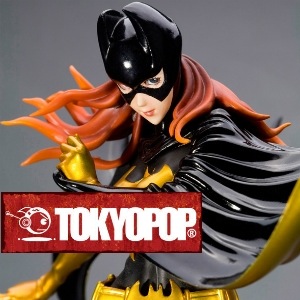


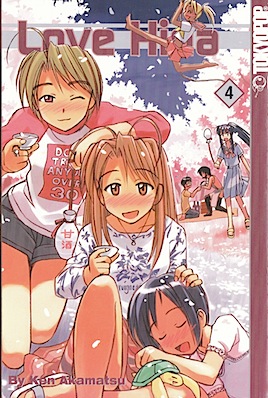



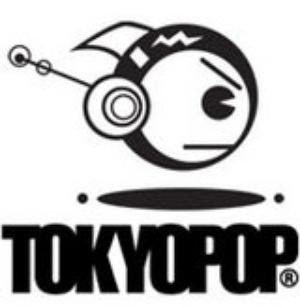 Word is going around that LA manga publisher
Word is going around that LA manga publisher


 Tokyopop held their scheduled webinar on Wednesday and Deb Aoki has
Tokyopop held their scheduled webinar on Wednesday and Deb Aoki has  David Welsh has
David Welsh has  Meanwhile, what about Tokyopop? The company has been seen as staging a bit of a comeback after a rough year or so which saw big layoffs. They recently announced
Meanwhile, what about Tokyopop? The company has been seen as staging a bit of a comeback after a rough year or so which saw big layoffs. They recently announced  Don MacPherson has been covering the other side of Tokyopop’s publishing of late, namely their once much touted OEL line. In a recent column,
Don MacPherson has been covering the other side of Tokyopop’s publishing of late, namely their once much touted OEL line. In a recent column,  Tokyopop also recently announced that other finished but not published OEL titles would go online:
Tokyopop also recently announced that other finished but not published OEL titles would go online: § Speaking of Tokyopop, SHUTTERBOX by Tavicat, a pioneering work of Ameri-manga is now back in the hands of the creators, according to a
§ Speaking of Tokyopop, SHUTTERBOX by Tavicat, a pioneering work of Ameri-manga is now back in the hands of the creators, according to a 



Im curious as to the face expressions of the panelist and the audience at this announcement.
Just some quick back-of-the-envelope math: TP paid out more than $2 million in page rates over a very short period of time to creators who were never previously published. Most very young. Much more than half female. I’ll guess that for 80% of them, they haven’t made as much money-per-page since. That was a pretty unique commitment that I don’t see ever happening again.
Moreover, there are a few known publishers who currently pay the same rate (about $100) and take the same rights (50% of at least publishing, sometimes also all media). That’s a terrible deal, but it is not unique to TP. TP’s OEL initiative was a complete failure. Every title lost money (they liked to pretend Dramacon was the one comic that saw a profit). It could have at least been remembered as interesting and ambitious, but the company always stuck to their bad practices–and they have always been blind when it comes to PR.